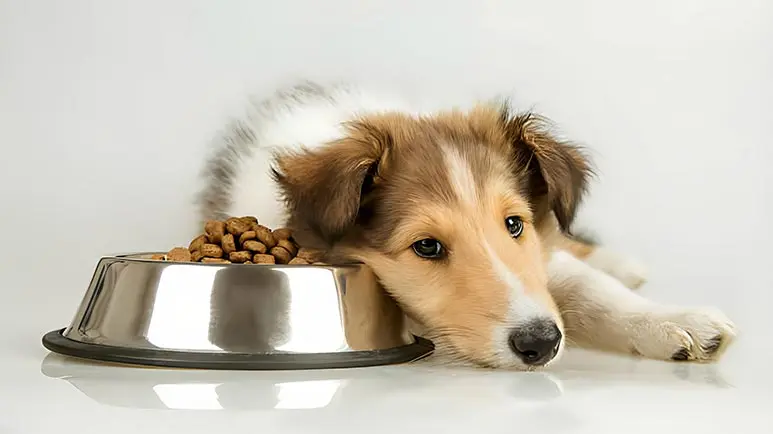Is Your Pet Consuming These Dangerous Ingredients?
Discover the hidden dangers lurking in ultraprocessed pet food that might be causing serious health issues for your beloved pet. Uncover expert advice on making safer, healthier food choices to protect them from these risks.

STORY AT-A-GLANCE
- As more novel ingredients are added to ultraprocessed pet food, it’s important to be aware of potential “hazards of emerging concern” with regard to these ingredients
- Novel ingredients posing potential hazards to your pet’s health include wheat gluten, turmeric, chicken meal, milk-based products, and honey
- The best way to avoid these hazards and protect your dog or cat’s health is to feed a nutritionally optimal, species-specific diet of unadulterated, high-quality animal protein, moisture, healthy fats and fiber, and low to no starch content
Join the Bark & Whiskers™ Family
Sign up today for our FREE newsletter, packed with expert advice and insider tips to keep your beloved pet in tip-top shape.
View our Privacy Policy and Terms of Service.
A recent article in a pet food industry journal raises troubling concerns about the potential hazards of certain “novel” ingredients in ultraprocessed dog and cat food. According to Tim Lombardo, senior director for food consulting services at EAS Consulting Group, these “hazards of emerging concern” will arise in the next several years and will be mostly related to “food fraud.”1
Lombardo defines food fraud as “hazards created when the intent is economic gains.”
“As we have novel ingredients, we have more products coming from foreign manufacturers using those ingredients,” Lombardo explained during a speech on April 30, 2024, at the Pet Food Forum. “Food fraud tends to be more prevalent not only in pet food but also in humans. And so, for those manufacturers who manufacture human-grade pet foods, a lot of the same food fraud concerns for human food are transferred over to pet food as well.
It's not to cause harm. It's to cause profits for the ingredient manufacturers. However, some of the unintended results of fraud are illness or even death of a consumer, whether it's a pet, or a commercial animal or human.”
The takeaways from this statement: 1) novel ingredients in commercial pet food, including human-grade pet food, are often imported from foreign countries/manufacturers, 2) food fraud related to these novel ingredients is driven by profits, and 3) food fraud can result in illness and death.
If you’re still feeding an ultraprocessed diet to your dog or cat, at a minimum you’ll want to try to avoid products containing the following ingredients.
Novel Pet Food Ingredients That Can Present Hazards
- Wheat gluten — The vast majority of large-scale pet food recalls involve ultraprocessed diets. Many pet parents remember the huge and frightening 2007 pet food recall (the details of which are no longer available at FDA.gov) for melamine contamination. The melamine was found, along with cyanuric acid, in wheat gluten that contained ingredients imported from China. The combination of melamine and cyanuric acid is known to cause kidney failure in pets. Many dogs and cats became very sick, and some died after eating melamine-contaminated food.
Per Lombardo, melamine might be added to wheat gluten to artificially increase protein content. Co-contaminants of melamine, the result of incomplete reactions during production of melamine, include cyanuric acid, ammelide and ammeline.
Not only does wheat gluten present a potential source of melamine contamination in pet food, but it’s a non-nutritious filler ingredient that causes gastrointestinal (GI) fermentation and other GI upsets and is linked to the tremendous problem of allergic conditions in today’s dogs and cats. - Turmeric — According to Lombardo, this ingredient, which enhances the brightness of color, can be contaminated with lead chromate. This is unfortunate, because the active ingredient in turmeric, curcumin, possesses potent anti-inflammatory properties and has been used for thousands of years in Ayurvedic and Traditional Chinese Medicine as a safe, powerful, inflammation-fighting agent.
More recently, Western and holistic medicine evidence points to the benefits of turmeric in supporting healthy organ function in humans and animals due to its antioxidant, anti-inflammatory, antiviral, antibacterial, antifungal and anticancer properties.
All mammals can potentially benefit from this healing spice, but not as an ingredient in ultraprocessed pet food. In addition to the potential for lead chromate contamination, it’s unlikely that turmeric added during the extreme manufacturing process commercial pet food undergoes is of much benefit in the finished product.
However, most dogs and cats readily accept a little fresh turmeric seasoning on their meals. If you want to safely increase the amount of biologically available curcumin in your pet's diet, you'll need to go with a human-grade, high-quality organic turmeric product. - Chicken meal — This ingredient if often substituted for real chicken in ultraprocessed pet food and may include unknown microbiological, chemical and physical hazards. Unlike fresh unprocessed meat, meat meal (including chicken meal) is the result of the rendering process.
Most ultraprocessed pet food contains rendered ingredients. Rendering plants create meat (and bone) meal from a variety of dubious sources. Chicken meal is made from chicken muscle meat and/or bones and/or internal organs that have been ground or otherwise reduced in particle size. The quality of meat used in these meals can range from human-grade to diseased, and there's no way to know which is in your pet's food.
In addition, chicken by-product meal can contain more pieces and parts than chicken meal, including necks, feet, undeveloped eggs, and intestines. Because "by-products" is a massive category and there's no way to assess the quality of raw ingredients used, it's best to avoid pet food containing by-product meal as well. - Milk-based products — According to Lombardo, these products can be adulterated with reconstituted milk powder, urea, rennet, oil, detergent, caustic soda, sugar, salt and skim milk powder. Or they might be watered down and then supplemented with melamine to artificially raise the protein content and hide dilution.
There’s no reason for weaned dogs and cats to drink milk. The reality is that adults of any species (including cats) typically have trouble digesting the milk of another species, which can result in digestive issues such as diarrhea or vomiting.
Even if a dog or cat retains the ability to digest lactose into adulthood (just as some humans do), cow's milk offers no nutritional value, and since it’s high in fat, it adds empty calories to the diet. Cow’s milk also contains high levels of phosphate, which can exacerbate chronic kidney disease in cats.2 - Honey — Lombardo describes honey as “one of the most fraudulent ingredients,” that might be adulterated with corn syrup and colorants. In addition, honey isn’t a species-appropriate food for dogs or cats, and there’s no reason it should be included in pet diets.
However, if you have an allergic pet, locally produced honey contains a small amount of pollen from the local area that can help desensitize the body to local allergens over time. The best place to find local honey is at a farmer's market or neighborhood health food store. Check with your veterinarian about the right dose for your dog or cat.
The only other reason to reach for honey for your pet, specifically manuka honey, is to manage resistant skin infections (for example, hot spots, feline acne, and acral lick dermatitis), burns, and large wounds that can’t be closed surgically.
Fresh Food Is the Best Food for Pets
The best way to protect furry family members from the hazards of emerging concern in pet foods discussed above is to feed a fresh diet.
Consider transitioning your pet away from “fast food” (kibble, canned), and instead feeding a nutritionally optimal, species-specific diet, which means food containing unadulterated, high-quality animal protein, moisture, healthy fats and fiber, with low to no starch content.
A nutritionally balanced raw or gently cooked homemade diet is the top choice for pets, but only for those pet parents who are committed to doing it right. If you don't want to deal with balancing diets at home, feeding a pre-balanced, commercially available raw food is a good alternative.
And be sure to incorporate a variety of fresh foods into your pet's diet, too. Blueberries, chia and hemp seeds in coconut oil, raw pumpkin seeds, fermented vegetables, and kefir can provide your animal companion with a variety of nutrition and flavors.
Sources and References
Unlock Pro Tips for Pet Wellness
Get exclusive access to expert insights and holistic health tips for your furry friend – all for FREE because your pet’s well-being is our top priority.
View our Privacy Policy and Terms of Service.











